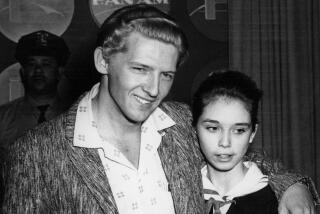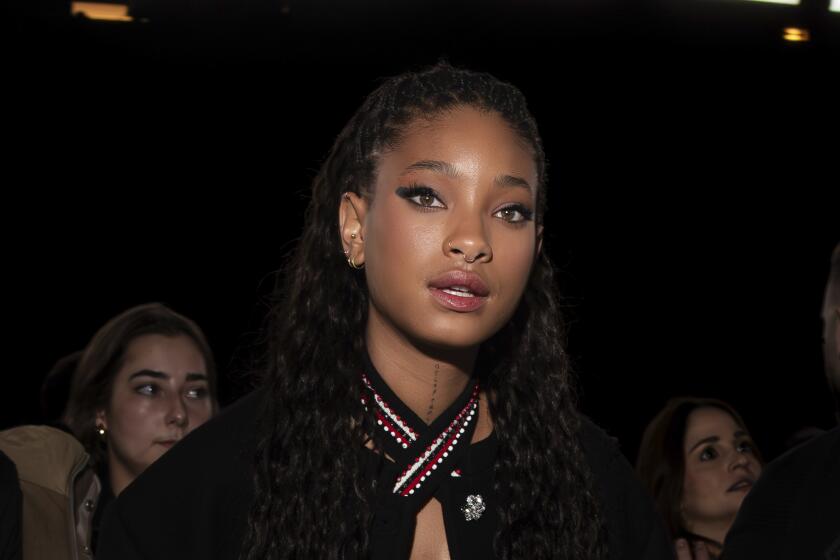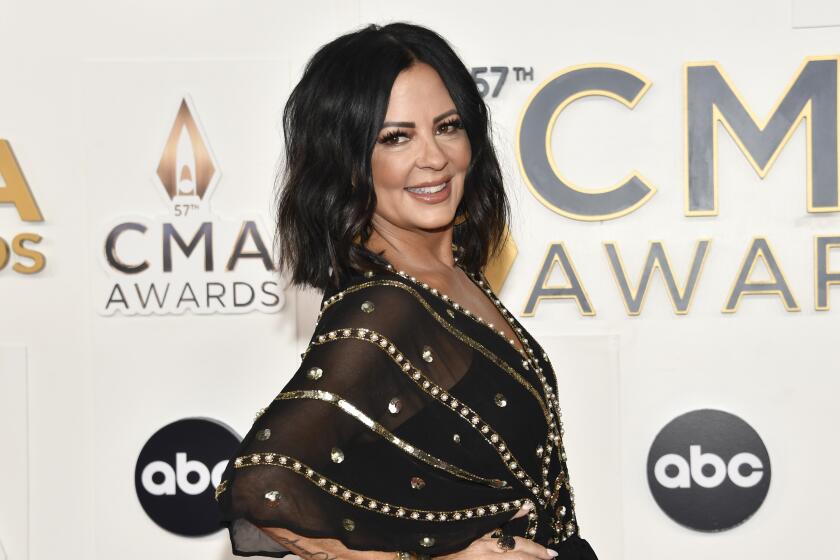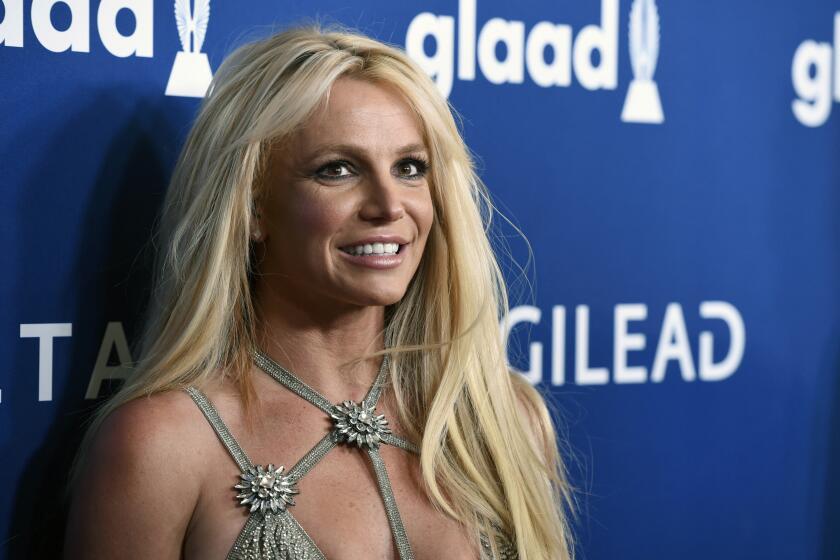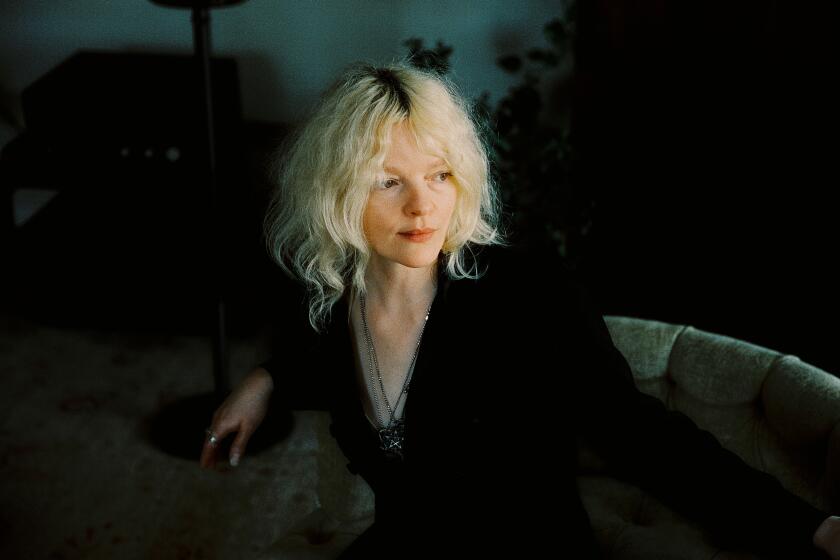POP MUSIC : ‘Free’ but Not Cheap : Garth Brooks does what he has to do--signing a rich new contract and raising money to repair L.A.
Popularity and power make headlines, and no one generates more these days than Garth Brooks.
Less than four weeks into the new year, Brooks--who sold $231 million in records last year, more than any other country or pop artist--has already made news on several fronts, including signing a spectacular new recording contract with Liberty Records that gives him a royalty rate rivaled only by that of Michael Jackson--in the 25% to 30% range.
On Jan. 29, Brooks hopes to raise about $1 million for Los Angeles riot relief by giving two sold-out concerts at the Forum. Two days later he’ll sing the national anthem at the Super Bowl in Pasadena. Not bad for a 30-year-old who six months ago said he might retire to devote more time to his wife and 6-month-old daughter.
During a break in a Nashville recording session, Brooks reflected on the recent events , including his song “We Shall Be Free,” the post-L.A. riots expression of brotherhood that many country radio programmers rejected as too liberal for country audiences.
*
Question: You were in Los Angeles to appear on the Academy of Country Music TV awards show the night the riots broke out last April. How did it affect you?
Answer: A bunch of us, including Clint (Black) and (Travis) Tritt, were changing clothes after the show and someone came busting into the room, saying, “Guys, they found them (the four policemen accused of beating Rodney King) not guilty, and we’d best get the hell out of here.” Sure enough, everything seemed to start going nuts. We didn’t know what to do.
I had (wife) Sandy, who was pregnant, with me and I didn’t want her to get excited or anything, so we decided not to spend the night like we had planned. We just got on our bus and drove all night. We tried to watch the news on TV, but you know how the picture goes in and out all the time when you are on the road . . . so you’d just get a report here and another there so it was hard to know what was actually happening.
During this whole time, I kept thinking about this Stephanie Davis song called “Our Time Will Come” that we were working on. For some reason, I just couldn’t get the song out of my head. I called her the next day from the Grand Canyon and asked if she was aware of what was going on and she said, “I’m already ahead of you. The song is now called ‘We Shall Be Free.’ ”
*
Q: What were your feelings during the riots--compassion for the victims or sadness for the people who felt so disenfranchised that they would take to the streets?
A: I guess my biggest problem with the riots was dealing with the (beliefs) that we all grow up with in this country--the idea that you don’t take the law into your own hands because the justice system will work for everyone. For me, that just seemed to fall through the floor that day.
I think these people had to express their voice and the only way, unfortunately for them, was to tear their own back yard up. I know a lot of people were saying, “Well, they had more choices than that.” But I don’t know. Put yourself in the shoes of those people and ask yourself how many choices did you have.
*
Q: How surprised were you by the verdict in the case?
A: I remember sitting on the bus thinking, “Please, God, please show me something that we haven’t seen . . . something that is going to justify the end result here.” Well, I’m sorry--and I don’t know the whole story and I don’t mean to hurt anybody’s feelings--but I never saw anything that justified letting that beating go unpunished.
*
Q: What was the reaction when you started doing “We Shall Be Free” in concert a few months later?
A: I know people say that concerts are usually full of your fans so they are bound to like everything you do, but you can tell the difference in the response to certain songs and we’ve always gotten great response to that song . . . and we still do.
*
Q: Were you surprised when the song got so much resistance on country radio?
A: I know some radio programmers said they put it in heavy rotation and that the song just didn’t get the calls requesting it. And that’s cool, they gave it a chance. But there were some people who flat out confessed, “Hey, I don’t think my audience wants to hear this, so I’m not going to play it,” and I think that was wrong.
To tell you the truth, it was one line that kept the song from being played: “When we’re free to love anyone we choose / Then we shall be free.”
*
Q: You touched on a lot of sensitive issues with that . . . because you could be talking about racial and sexual tolerance--and that’s something that runs against the grain of most country music.
A: I’ve been called everything from Brutus to Judas because of that line, which was intentionally meant (to cover) everybody. People even said that I have lost Christian values and stuff, and that hurts. I don’t believe in God any less because of the song. I don’t see how loving anybody can be a sin. I still feel strongly about the song and I’m glad the National Football League wants to use it as the theme for the Super Bowl game.
*
Q: What about your contract negotiations? Was the talk about retirement a way to put pressure on the record company?
A: I really was talking about whether I wanted to keep touring, which only sounds strange to people because most people are never in a position to even think about it.
To me, the reason most people leave their child in the morning is to support their family. I think if you asked every man and woman out there, “If you didn’t have to leave your child . . . say you won the lottery, would you go to work Monday morning?” My guess is, he’d say, “Hell, no.”
Well, I was at the point last year where I didn’t have to leave my child ever again to support my family. By then, we had more money than we could ever spend--and I had to deal with that.
*
Q: But wasn’t it convenient to talk about retirement during the recording contract negotiations?
A: As far as the negotiations, I’ll tell you exactly what I told (executives) Jimmy Bowen, Jim Fifield and Joe Smith . . . the thing that started the whole negotiations.
I felt like a chump every time I stepped up to the microphone. I had signed a deal at 2 million records and 30 million records later I was still on the same deal (and modest royalty rate). In the meantime, I saw my label go to a top penthouse floor of a building here in Nashville. I saw three sub-labels spin off of it. And when they tell you that you are 68% of your whole label’s income, you kind of feel like you’d like for someone just to come up and just say, “Hey, thanks.”
I finally had to go in and fight for what I thought was mine. The band and all the people who work with me bust their ass and I wanted to see them rewarded, too, instead of just seeing everybody else’s people rewarded.
*
Q: What about the touring? Is the retirement talk over?
A: My biggest problem with the retirement thing was I’d be leaving the part of this business that I enjoy the most . . . the entertaining part, being on stage and seeing how the music affects people. So, we’ve figured out a way to tour with the whole family, weekends back to back. If the demand can stay like it is, we’ll be able to stay a few days in a city . . . maybe rent a house or some place so that it can be something like home. I can get to sleep with my wife at night and I get to see my child all during the day and go to work at night.
*
Q: Are you optimistic about the future? When you are on stage singing “We Shall Be Free,” do you believe the words?
A: I see a lot of things--good and bad--but 9 out of 10 things I see are good things about people . . . people calling and asking me to do something for someone else, not for them. I think that’s wonderful.
I’m not sure we are heading in the right direction when it comes to money and the ecology, but as far as brotherly love, I do think we are getting there. I think the ‘80s brought a lot of emphasis on the individual, which is cool, but life is a team sport and we all have a role to play.
More to Read
The biggest entertainment stories
Get our big stories about Hollywood, film, television, music, arts, culture and more right in your inbox as soon as they publish.
You may occasionally receive promotional content from the Los Angeles Times.


